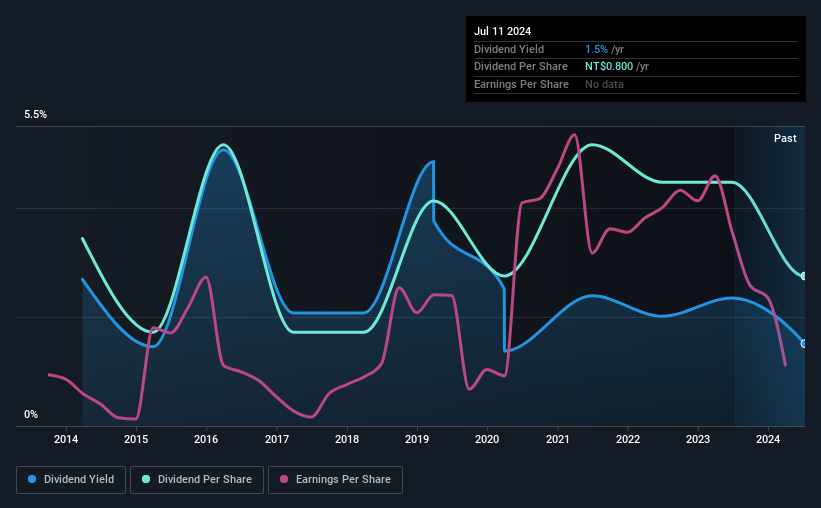Chunghwa Chemical Synthesis & Biotech's (TWSE:1762) Dividend Is Being Reduced To NT$0.80

Chunghwa Chemical Synthesis & Biotech Co., Ltd. (TWSE:1762) has announced that on 19th of August, it will be paying a dividend ofNT$0.80, which a reduction from last year's comparable dividend. This means that the annual payment will be 1.5% of the current stock price, which is in line with the average for the industry.
View our latest analysis for Chunghwa Chemical Synthesis & Biotech
Chunghwa Chemical Synthesis & Biotech's Payment Has Solid Earnings Coverage
Solid dividend yields are great, but they only really help us if the payment is sustainable. Based on the last payment, Chunghwa Chemical Synthesis & Biotech's earnings were much higher than the dividend, but it wasn't converting those earnings into cash flow. Since a dividend means the company is paying out cash to investors, this could prove to be a problem in the future.
Unless the company can turn things around, EPS could fall by 14.2% over the next year. If the dividend continues along the path it has been on recently, we estimate the payout ratio could be 59%, which is definitely feasible to continue.

Dividend Volatility
While the company has been paying a dividend for a long time, it has cut the dividend at least once in the last 10 years. The dividend has gone from an annual total of NT$1.00 in 2014 to the most recent total annual payment of NT$0.80. Doing the maths, this is a decline of about 2.2% per year. Generally, we don't like to see a dividend that has been declining over time as this can degrade shareholders' returns and indicate that the company may be running into problems.
The Dividend Has Limited Growth Potential
With a relatively unstable dividend, it's even more important to see if earnings per share is growing. Chunghwa Chemical Synthesis & Biotech's EPS has fallen by approximately 14% per year during the past five years. This steep decline can indicate that the business is going through a tough time, which could constrain its ability to pay a larger dividend each year in the future.
Chunghwa Chemical Synthesis & Biotech's Dividend Doesn't Look Sustainable
In summary, dividends being cut isn't ideal, however it can bring the payment into a more sustainable range. While the low payout ratio is a redeeming feature, this is offset by the minimal cash to cover the payments. Overall, we don't think this company has the makings of a good income stock.
Companies possessing a stable dividend policy will likely enjoy greater investor interest than those suffering from a more inconsistent approach. Still, investors need to consider a host of other factors, apart from dividend payments, when analysing a company. For instance, we've picked out 1 warning sign for Chunghwa Chemical Synthesis & Biotech that investors should take into consideration. If you are a dividend investor, you might also want to look at our curated list of high yield dividend stocks.
New: AI Stock Screener & Alerts
Our new AI Stock Screener scans the market every day to uncover opportunities.
• Dividend Powerhouses (3%+ Yield)
• Undervalued Small Caps with Insider Buying
• High growth Tech and AI Companies
Or build your own from over 50 metrics.
Have feedback on this article? Concerned about the content? Get in touch with us directly. Alternatively, email editorial-team (at) simplywallst.com.
This article by Simply Wall St is general in nature. We provide commentary based on historical data and analyst forecasts only using an unbiased methodology and our articles are not intended to be financial advice. It does not constitute a recommendation to buy or sell any stock, and does not take account of your objectives, or your financial situation. We aim to bring you long-term focused analysis driven by fundamental data. Note that our analysis may not factor in the latest price-sensitive company announcements or qualitative material. Simply Wall St has no position in any stocks mentioned.
Have feedback on this article? Concerned about the content? Get in touch with us directly. Alternatively, email editorial-team@simplywallst.com
About TWSE:1762
Chunghwa Chemical Synthesis & Biotech
Chunghwa Chemical Synthesis & Biotech Co., Ltd.
Excellent balance sheet slight.
Similar Companies
Market Insights
Community Narratives




